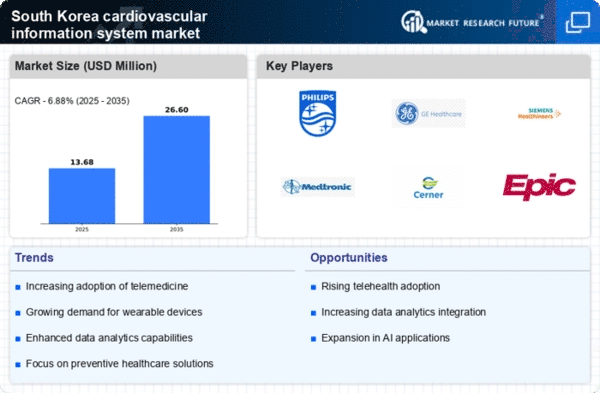Increasing Health Awareness
The rising awareness among the South Korean population is a crucial driver for the cardiovascular information system market. As individuals become more informed about cardiovascular diseases and their risk factors, there is a growing demand for preventive healthcare solutions. This trend is reflected in the increasing number of health screenings and check-ups, which are expected to rise by 20% in the coming years. Consequently, healthcare providers are investing in advanced information systems to manage patient data more effectively and provide tailored health solutions. The emphasis on preventive care is likely to propel the cardiovascular information-system market, as providers seek to implement systems that support early detection and intervention.
Integration of Big Data Analytics
The integration of big data analytics into healthcare is emerging as a pivotal driver for the cardiovascular information-system market. In South Korea, healthcare providers are increasingly utilizing big data to analyze patient outcomes, treatment efficacy, and disease patterns. This analytical approach allows for more informed decision-making and personalized treatment plans, which are essential in managing cardiovascular diseases. The market for big data in healthcare is projected to grow at a CAGR of 25% over the next five years, indicating a robust demand for systems that can handle large volumes of data. As healthcare organizations seek to leverage data for improved patient care, the cardiovascular information-system market is likely to benefit from this trend.
Advancements in Medical Technology
The cardiovascular information-system market is experiencing a surge due to rapid advancements in medical technology. Innovations such as artificial intelligence, machine learning, and telemedicine are enhancing diagnostic accuracy and patient management. In South Korea, the integration of these technologies into cardiovascular systems is projected to increase efficiency by approximately 30% over the next few years. This technological evolution not only improves patient outcomes but also streamlines workflows for healthcare providers. As hospitals and clinics adopt these advanced systems, the demand for sophisticated cardiovascular information systems is likely to rise, driving market growth. Furthermore, the increasing reliance on data analytics for personalized treatment plans is expected to further bolster the market, as healthcare professionals seek to leverage technology for better patient care.
Government Initiatives and Funding
Government initiatives aimed at improving healthcare infrastructure are significantly impacting the cardiovascular information-system market. In South Korea, the government has allocated substantial funding to enhance healthcare services, particularly in the realm of cardiovascular health. This funding is directed towards the development and implementation of advanced information systems that facilitate better patient monitoring and data management. Reports indicate that government investments in health technology could reach upwards of $500 million by 2027, fostering innovation and encouraging private sector participation. Such initiatives not only enhance the capabilities of healthcare providers but also ensure that patients receive timely and effective care, thereby driving the growth of the cardiovascular information-system market.
Aging Population and Chronic Diseases
The demographic shift towards an aging population in South Korea is significantly influencing the cardiovascular information-system market. As the elderly population grows, the prevalence of chronic diseases, particularly cardiovascular conditions, is expected to rise. Projections indicate that by 2030, nearly 25% of the population will be over 65 years old, leading to an increased demand for specialized healthcare services. This demographic trend necessitates the implementation of advanced cardiovascular information systems to manage the complexities of chronic disease management effectively. Healthcare providers are likely to invest in these systems to enhance patient care and streamline operations, thereby driving market growth in the cardiovascular information-system sector.
















